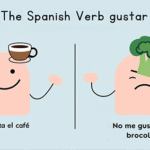Complete Guide to the Verb GUSTAR with Conjugation Rules and Examples
Struggling to say “I like” in Spanish? You’re not alone. The verb Gustar is one of the most common yet tricky verbs for English speakers to master. Unlike most Spanish verbs, it doesn’t follow the standard conjugation rules you learned with verbs like ser or tener.
But don’t worry! This complete guide will break down exactly how to use Gustar, with clear conjugation rules, practical examples, and a handy formula you can use every time. By the end, you’ll be expressing your likes and dislikes in Spanish with confidence, which is essential for your DELE A1 exam preparation.
Why is the Verb Gustar So Different?
The core of the confusion lies in a fundamental difference between English and Spanish. In English, we say “I like music.” The subject (I) performs the action of liking the object (music).
In Spanish, the logic is flipped. The verb gustar literally means “to be pleasing to.” So, you’re not the one doing the liking; the thing is pleasing to you.
The Spanish equivalent of “I like music” is “Me gusta la música,” which translates literally to “Music is pleasing to me.”
This shift in perspective means everything about the sentence structure changes.
The Golden Formula for Using Gustar
To correctly form sentences with gustar, use this simple formula:
[Indirect Object Pronoun] + [Form of Gustar] + [Thing(s) Liked]
Let’s break down each part of this formula.
Part 1: Indirect Object Pronouns (IOPs) in Spanish
These tiny words are the key to gustar. They tell us to whom something is pleasing.
| English | Spanish Indirect Object Pronoun |
|---|---|
| To me / For me | me |
| To you (informal) | te |
| To him / her / You (formal) | le |
| To us | nos |
| To you all (Spain) | os |
| To them / You all | les |
Part 2: Conjugation of Gustar (Gusta or Gustan?)
You don’t conjugate gustar based on who is doing the liking. You conjugate it based on what is being liked.
- Use GUSTA (singular) when the thing liked is:
- A singular noun (el libro, la música)
- An infinitive verb (cantar, bailar, leer)
- Use GUSTAN (plural) when the thing liked is a plural noun (los libros, las manzanas).
Conjugation Chart & Examples for the verb Gustar
Let’s put the formula into practice with a clear conjugation table.
| English Meaning | Spanish Sentence | Literal Translation | Why? |
|---|---|---|---|
| I like the book. | (A mí) me gusta el libro. | “The book is pleasing to me.” | Singular noun → gusta |
| I like to sing. | (A mí) me gusta cantar. | “To sing is pleasing to me.” | Infinitive verb → gusta |
| You like cats. | (A ti) te gustan los gatos. | “Cats are pleasing to you.” | Plural noun → gustan |
| He likes the movie. | (A él) le gusta la película. | “The movie is pleasing to him.” | Singular noun → gusta |
| She likes to dance. | (A ella) le gusta bailar. | “To dance is pleasing to her.” | Infinitive verb → gusta |
| We like Spanish. | (A nosotros) nos gusta el español. | “Spanish is pleasing to us.” | Singular noun → gusta |
| You all (Spain) like cars. | (A vosotros) os gustan los coches. | “Cars are pleasing to you all.” | Plural noun → gustan |
| They like the beaches. | (A ellos) les gustan las playas. | “The beaches are pleasing to them.” | Plural noun → gustan |
“Remember, gustar conjugates differently from most verbs. If you want to master regular verb conjugations (like hablar, comer, vivir), be sure to check out our ultimate guide to ➡️Spanish Verb Conjugation Tool for all the rules and charts you need.”
Pro Tip: The phrases in parentheses (A mí, A ti, A él) are optional. They are used for emphasis or clarification, especially if you want to stress who you’re talking about (e.g., A mí me gusta, pero a él no – “I like it, but he doesn’t”).
How to Make Negative Sentences with gustar
To say you don’t like something, simply place no before the indirect object pronoun.
- I don’t like broccoli. → No me gusta el brócoli.
- They don’t like to run. → No les gusta correr.
- We don’t like tests. → No nos gustan los exámenes.
Common Mistakes to Avoid
- Using Subject Pronouns Incorrectly: Never say “Yo gusto la música.” This is a direct translation from English and is incorrect. The subject is the thing being liked, not the person.
- Mixing Up Gusta and Gustan: Remember the rule: one thing/activity = gusta; multiple things = gustan.
- Correct: Me gusta el café. (I like coffee.)
- Correct: Me gustan los cafés. (I like coffees / coffee shops.)
- Forgetting the Definite Article: In Spanish, you typically need the article (el, la, los, las) before the noun.
- Correct: Me gusta el fútbol.
- Incorrect: Me gusta fútbol.
Ready to Test Your Knowledge?
Reading the rules is the first step, but practice makes perfect! We’ve created a dedicated A1 Verb Gustar Quiz to help you master this essential Spanish verb.
Our interactive quiz provides immediate feedback and explanations for every answer, making it the perfect tool for DELE A1 exam preparation or for any beginner Spanish student.



